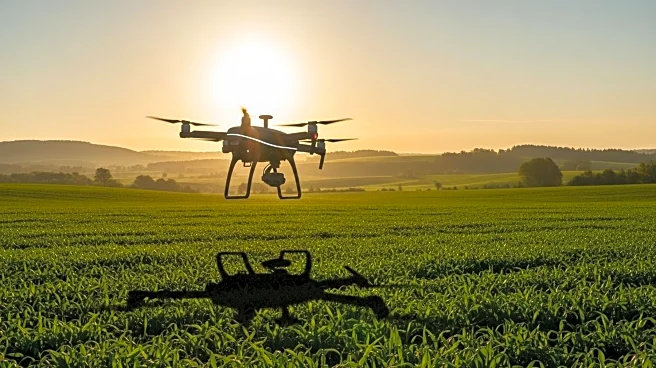What is the story about?
What's Happening?
A Connecticut-based startup, Almanax, founded by tech specialist Mike Quick and Jim Smith, owner of Cushman Farms, is exploring the use of drones to improve agricultural productivity. The initiative aims to increase crop yields and minimize losses due to unpredictable weather and disease. The drones, primarily sourced from China, face cost challenges due to tariffs, prompting the startup to consider local manufacturing. Connecticut Agriculture Commissioner Bryan Hurlburt highlights the benefits of drones, such as applying seeds while corn is still standing to maximize cover crop benefits. The state supports this technology through farm transition grants, encouraging larger farms to offer drone services to smaller operations. Drones can perform tasks like identifying plant health and mapping, reducing chemical use and soil compaction compared to traditional methods.
Why It's Important?
The integration of drone technology in agriculture represents a significant advancement in precision farming, offering potential solutions to challenges posed by climate change and resource management. By enabling early detection of plant health issues and optimizing resource application, drones can enhance crop resilience and sustainability. This technological shift could attract younger generations to farming, bridging the gap between agriculture and technology sectors. The economic implications include potential cost savings and increased efficiency for farmers, while also fostering innovation and job creation in the agricultural technology domain. The initiative aligns with broader efforts to modernize farming practices and improve food security.
What's Next?
The startup plans to explore local manufacturing options to overcome tariff-related cost barriers. As drones become more integrated into farming practices, regulatory considerations such as FAA approvals for crop dusting will be crucial. The state legislature has already passed House Bill 6289, allowing licensed pesticide applicators to use drones for crop analysis and application. Future developments may include expanding drone services to smaller farms and enhancing grant programs to support technological adoption. The initiative could lead to increased collaboration between tech and agricultural sectors, fostering innovation and sustainability in farming.
Beyond the Headlines
The use of drones in agriculture not only addresses immediate challenges but also opens up new avenues for research and development in precision farming. Ethical considerations include ensuring equitable access to technology for small-scale farmers and addressing environmental impacts of drone usage. The cultural shift towards high-tech farming may redefine traditional agricultural roles, encouraging interdisciplinary collaboration and education. Long-term, this could lead to a more resilient agricultural sector capable of adapting to climate change and resource constraints.















